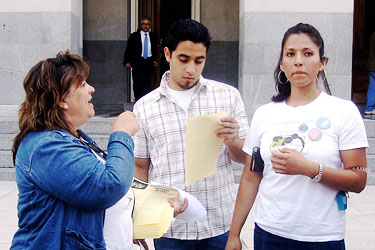Learn More About PUC
Scholarships and Support for Veterans
By Eirene-Gin Nakamura on July 7, 2010
Share this

Fiona Bullock, the Veterans Club sponsor, took students to the State Capitol to support a bill that makes it easier for forgotten veterans to receive honorable burial.
More attention has been given recently to the post-war lives of American soldiers, ranging from hit movies to efforts to educate troops and the general public about post traumatic stress. As this attention makes clear, the transition from army-man to the normal life is one that is not simple to execute. “It’s extremely frustrating to go from the battlefield to a civilian environment,” says Iraq veteran Adrian Avila. “The adjustment is really painful sometimes.”
Unbeknownst to most, this is a transition that a number of students have had to face at Pacific Union College when they return to studies after military service. Avila, a senior at PUC, saw the need to help students like himself adjust, and he collaborated with social work professor Fiona Bullock start the PUC Veterans Club “to serve veterans’ needs on campus and in our community.”
Bullock is an '83 PUC grad who started about two years ago working as a post traumatic stress disorder (PTSD) counselor at the Veterans Center in Sacramento, so she was already familiar with the re-assimilation challenges facing veterans — and very sympathetic to their experience and the complications they face at college. Bullock and Avila set out to address those challenges and offer a support system.
Avila's own experience of challenges when he returned to PUC — and the challenges he saw other veterans facing — helped clarify what some of the greatest needs were. When Avila first arrived after serving five months in Iraq, he faced difficulty in getting reacquainted with the civilian life and also found that the details of paperwork, processes, and credit were confusing. While PUC has historically served many veterans and the policies are all in place for college credit, finances, and such technicalities, it can be very confusing for students to wade through. "Military service can be translated into current school credit," explains Keith, but he adds that "this process is intricate and complicated."
So the Veterans Club has been instrumental in clarifying the process, making it more accessible, and helping students understand the processes. “The main focus of the club within this last year at PUC has been to assist the process that ensures a veteran can attend PUC and maximize the benefits they have earned,” says Keith.
But in addition to helping students with technical processes, the members of the club hope to provide support and recognition for veterans, act as mentors for anyone who may be considering joining the service, and serve as a support system for the students on campus and families in the local area who have family or close friends currently serving. During the 2009/2010 school year there were approximately 40 students at PUC, either veterans or family of veterans, receiving army benefits, including 17 who qualified for the benefits of the new Post 9/11 GI Bill. This group consists of veterans who have served in the Air Force, Navy, and/or the Marines.
The Veterans Club was one step in increasing support systems for these students, and various connections helped to spread the impact. Jennifer Wareham Best of the Teaching and Learning Center was appointed as PUC's Veterans Services Coordinator to “ease the transition from military service to college life.” As PUC's registrar Marlo Waters explains, Wareham Best "is filling an important role at PUC by serving as the point person for student veterans; she connects students with the veterans resources available at the college and she assists with the navigation of all the different offices, processes, and paperwork."
From those starting points, connections were made with other individuals in various departments. A new page on the PUC website was created for student veterans. The Veterans Club hosted a booth at the college's Fall Fest, a well attended initial meeting, and a panel discussion. For 2010/2011 school year, PUC also became a "Yellow Ribbon" school listed with the Department of Veteran Affairs (VA). That means we contribute scholarship money to student veterans and the VA matches funds, making a private college education even more affordable for veterans.
Keith is encouraged that support is growing and that PUC has networked with the various government agencies to ensure that veterans will have a smooth transition. “As the club’s identity forms through the friendships made," he says, "new veterans that arrive at PUC can integrate in with the networked resources in place.”
Latest News
Maxwell Scholar Feature: Liah Ronneburg
By Marina Maher on December 30, 2025
First Set of PUC’s North Coast Nursing Students Graduate
By Ally Romanes on December 23, 2025
Two Tonge Grants Awarded to M.A. in Communication and Aviation Program
By Marina Maher on December 22, 2025
PUC’s College Days Creates Lasting Connections
By Ally Romanes on December 18, 2025
